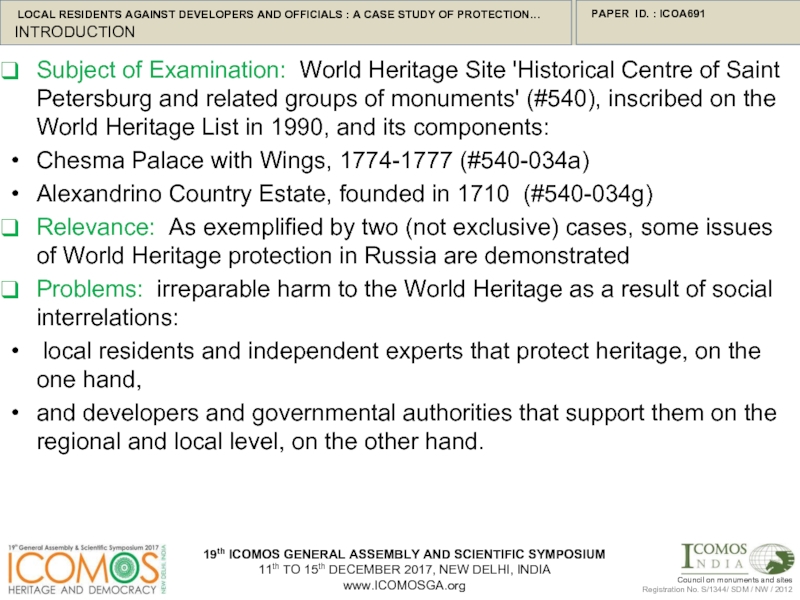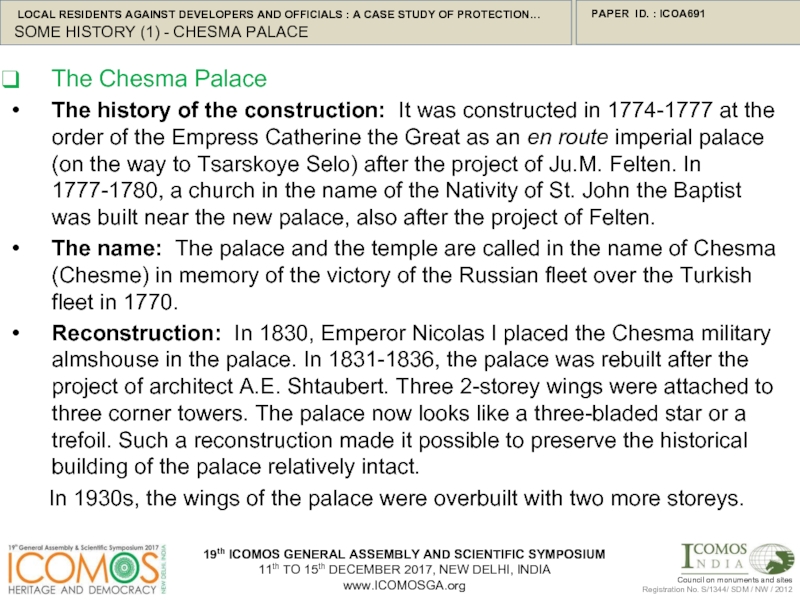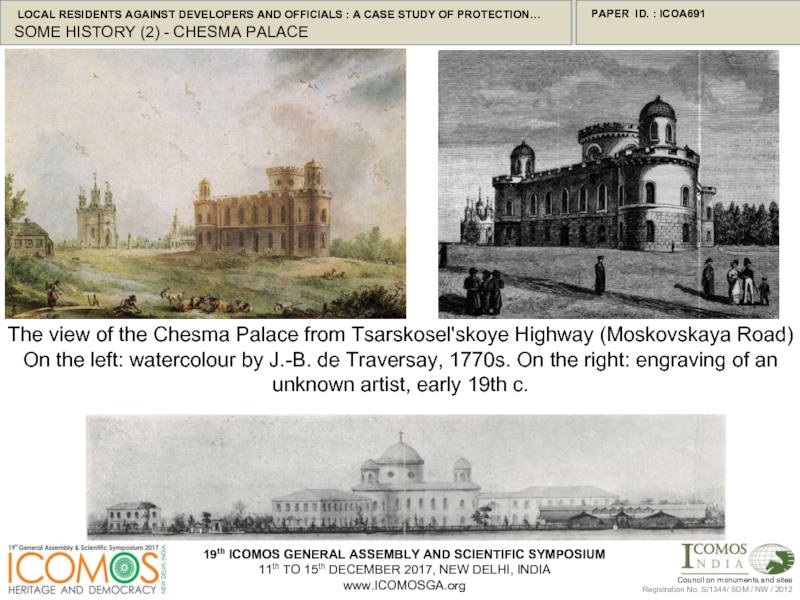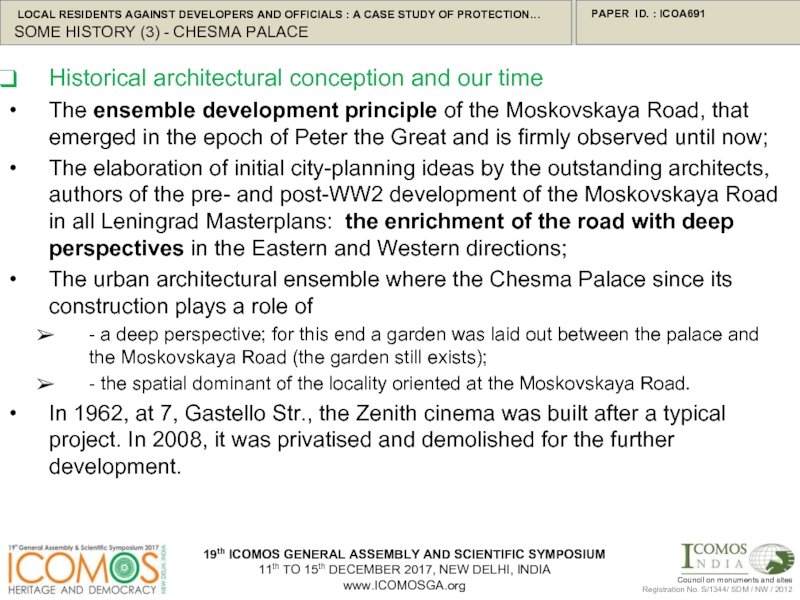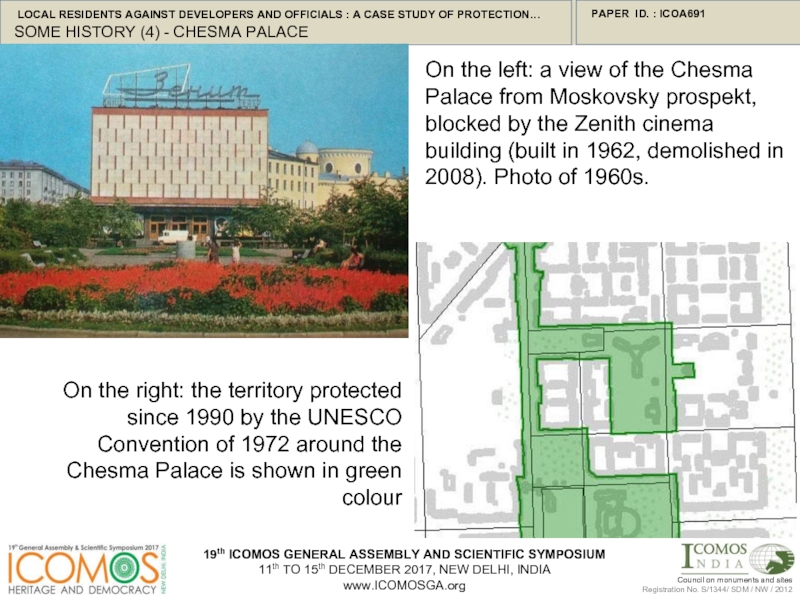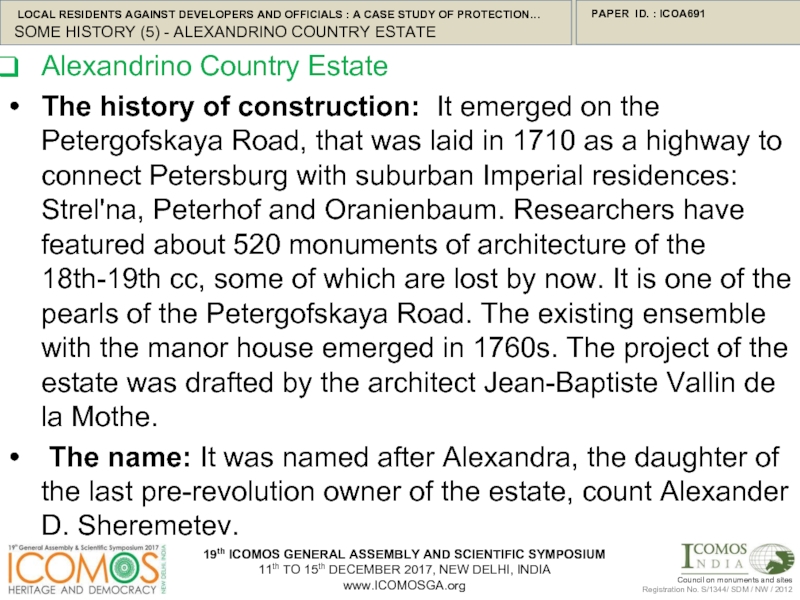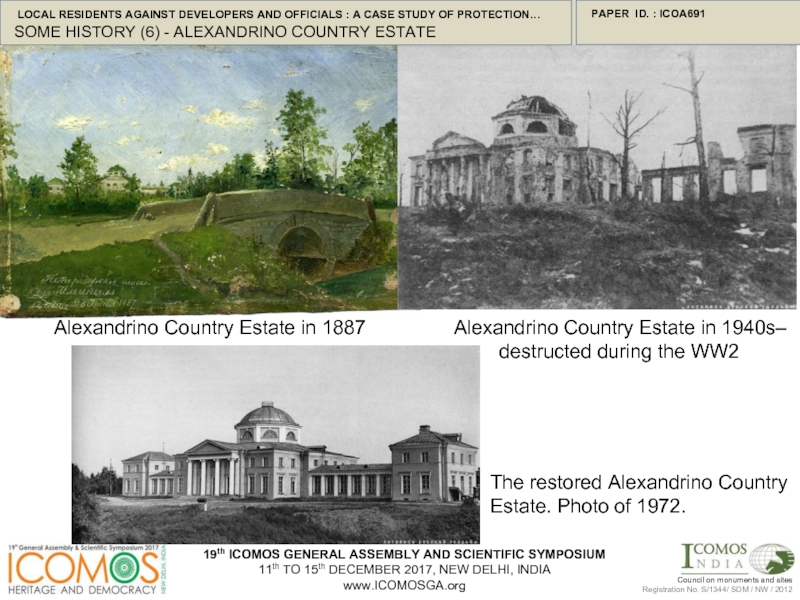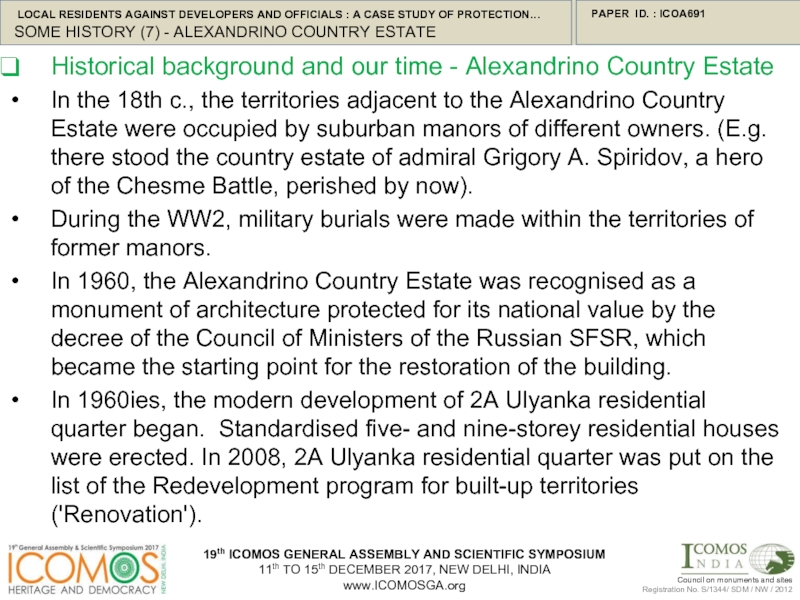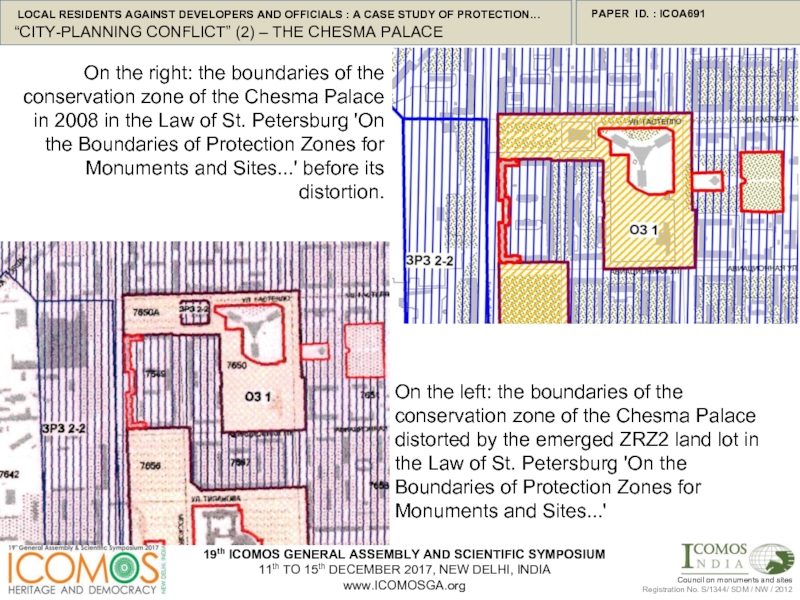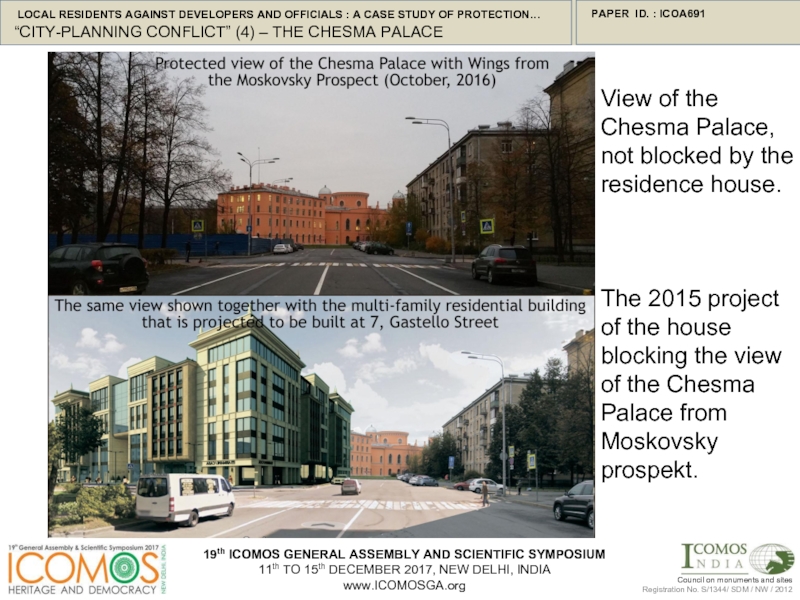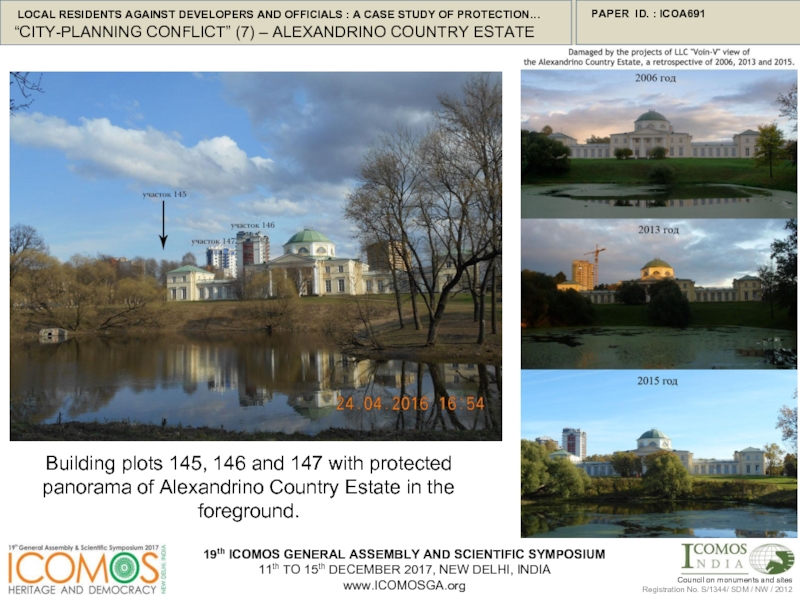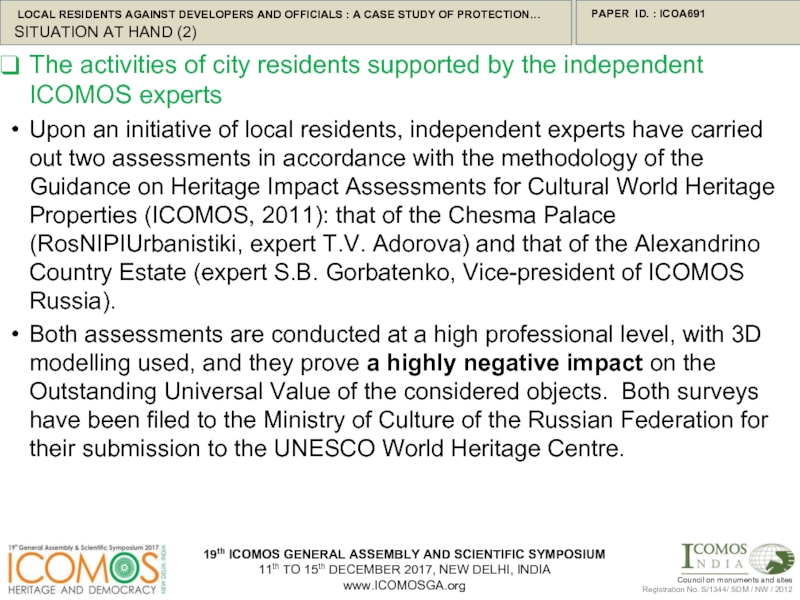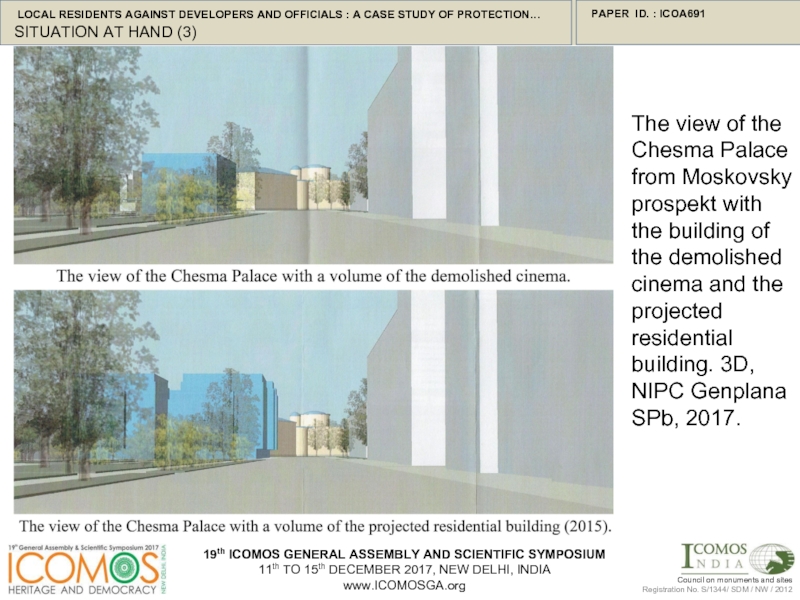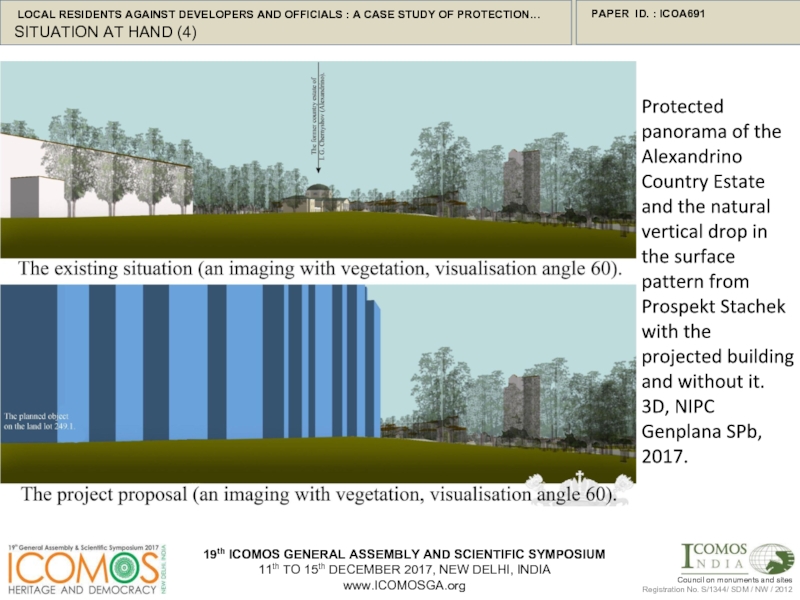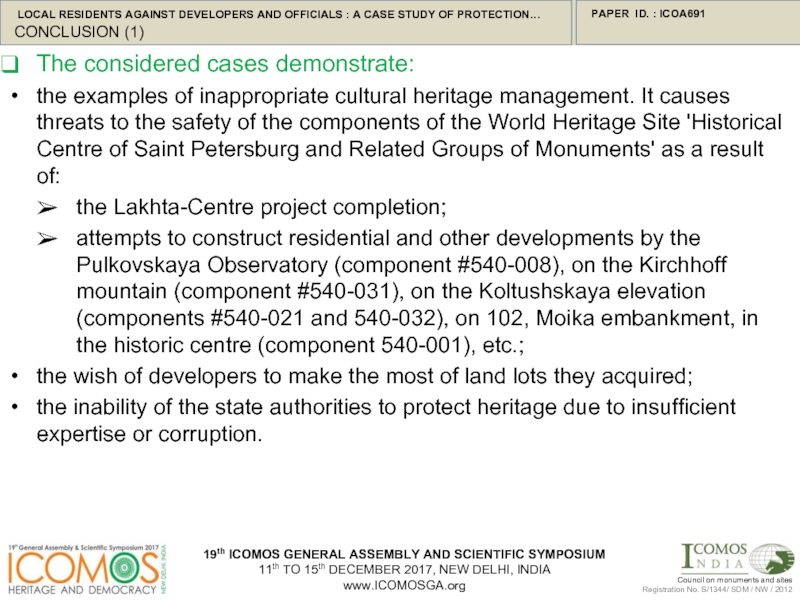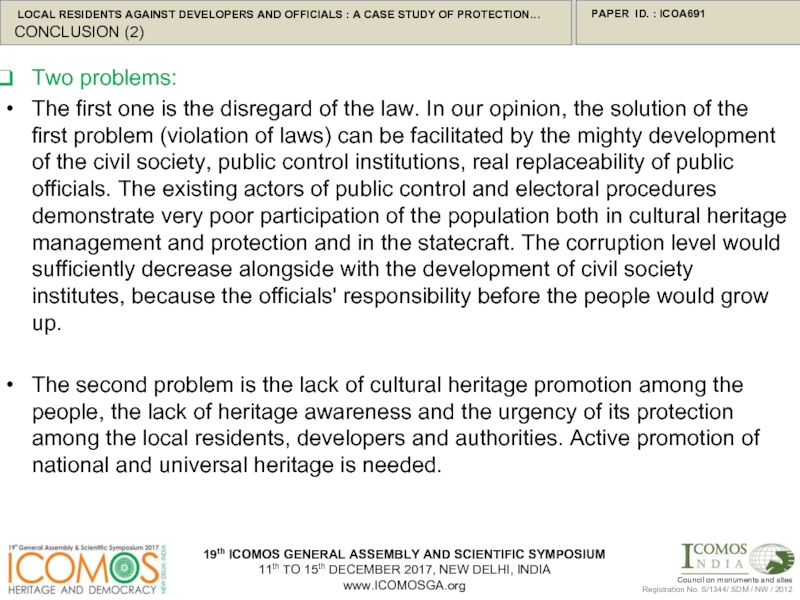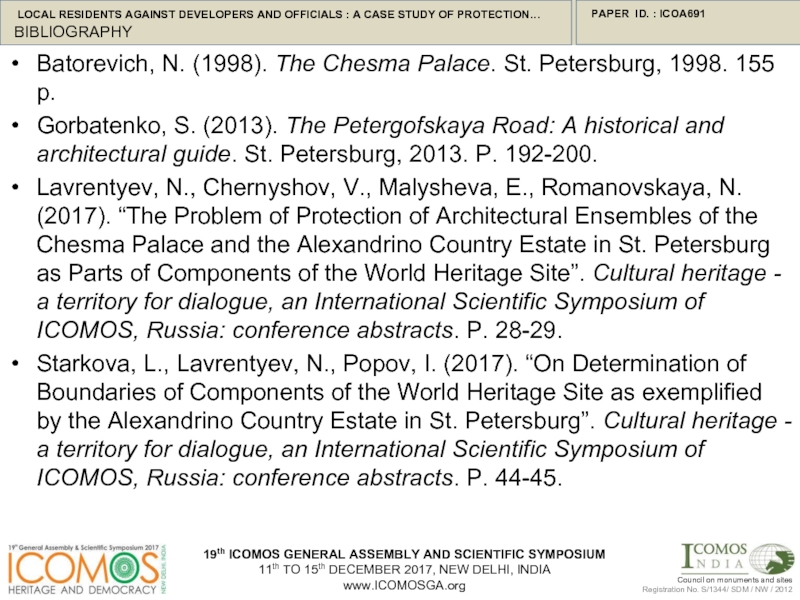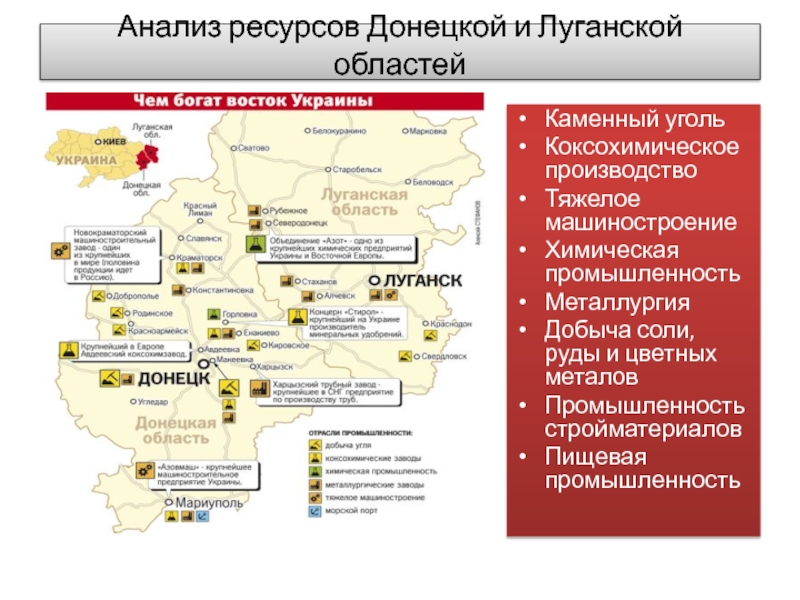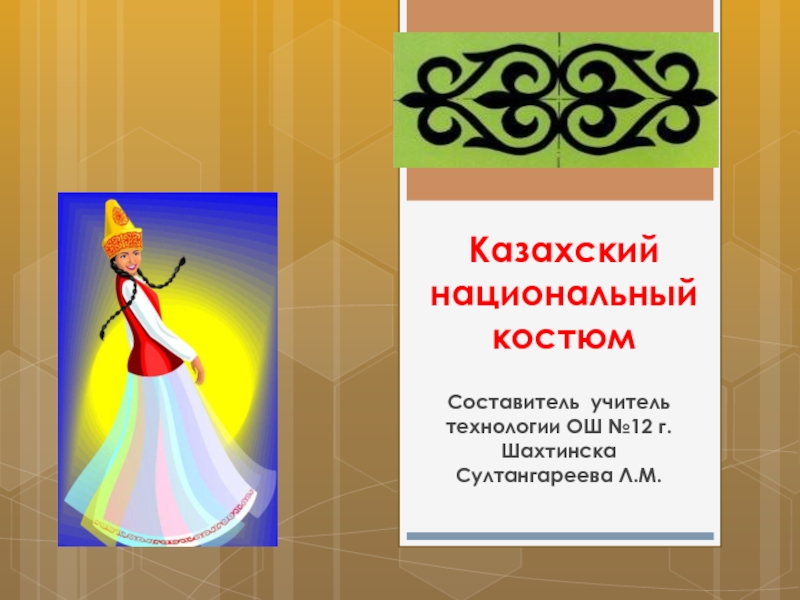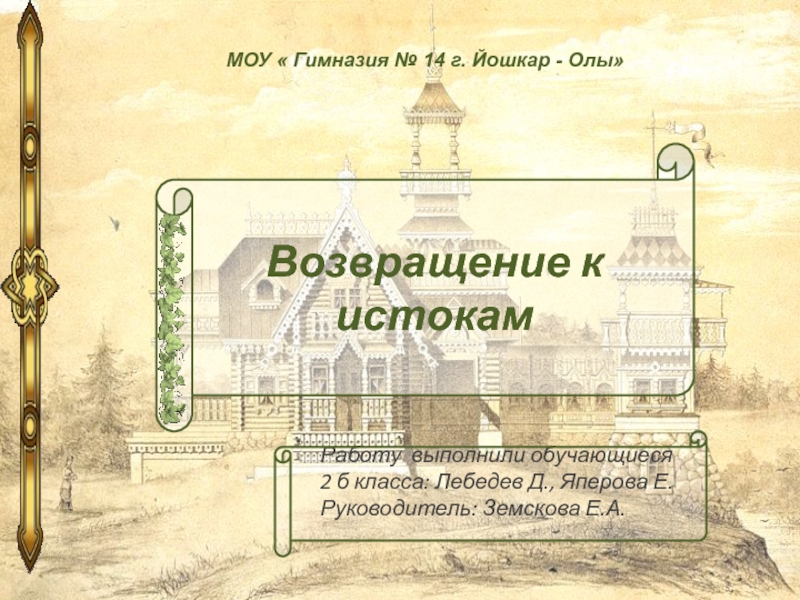Слайд 1
ST01 - Integrating Heritage and Sustainable Urban Development by Engaging Diverse
Communities for Heritage Management
11th TO 15th DECEMBER 2017, NEW DELHI, INDIA
www.ICOMOSGA2017.org
Council on monuments and sites
Registration No. S/1344/ SDM / NW / 2012
www.icomos.org
www.icomosindia.com
LOCAL RESIDENTS AGAINST DEVELOPERS AND OFFICIALS: A CASE STUDY OF PROTECTION OF ARCHITECTURAL ENSEMBLES OF CHESMA PALACE AND ALEXANDRINO COUNTRY ESTATE IN SAINT PETERSBURG (RUSSIA)
Nikolay Lavrentyev1, Dr Vladimir Chernushev2, Elena Malysheva3, Nataliya Romanovskaya4, Dr Irina Bogush5, Ilya Popov6
1Member of Board of ICOMOS Russia, Acting Chief of the Specialized Group for the Ecology of Ordinary Architecture (ERA Group), St. Petersburg, Russia
2PhD in Chemistry, Retired, St. Petersburg, Russia
3Chief of the Regional public organization “Ohtinskaya Duga”, St. Petersburg, Russia
4Chief project city planner at Russian Institute of Urbanistics, St. Petersburg, Russia
5PhD in Economy, Retired, St. Petersburg, Russia
6Chief of the Regional public organization “Mitrofanievsky union”, St. Petersburg, Russia
PAPER ID : ICOA691
19th ICOMOS GENERAL ASSEMBLY AND SCIENTIFIC SYMPOSIUM
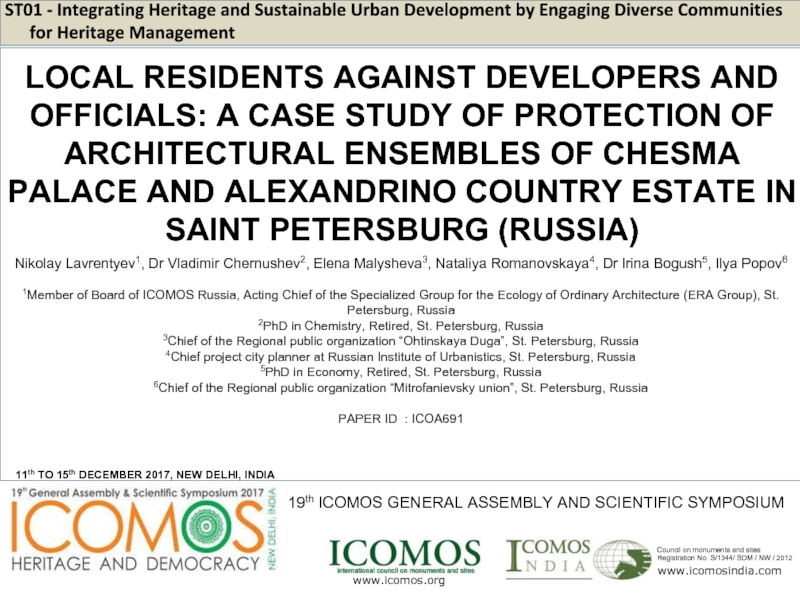
Слайд 2
PAPER ID. : ICOA691
Subject of Examination: World Heritage Site 'Historical Centre
of Saint Petersburg and related groups of monuments' (#540), inscribed on the World Heritage List in 1990, and its components:
Chesma Palace with Wings, 1774-1777 (#540-034а)
Alexandrino Country Estate, founded in 1710 (#540-034g)
Relevance: As exemplified by two (not exclusive) cases, some issues of World Heritage protection in Russia are demonstrated
Problems: irreparable harm to the World Heritage as a result of social interrelations:
local residents and independent experts that protect heritage, on the one hand,
and developers and governmental authorities that support them on the regional and local level, on the other hand.
Слайд 3
PAPER ID. : ICOA691
The Chesma Palace
The history of the construction: It
was constructed in 1774-1777 at the order of the Empress Catherine the Great as an en route imperial palace (on the way to Tsarskoye Selo) after the project of Ju.M. Felten. In 1777-1780, a church in the name of the Nativity of St. John the Baptist was built near the new palace, also after the project of Felten.
The name: The palace and the temple are called in the name of Chesma (Chesme) in memory of the victory of the Russian fleet over the Turkish fleet in 1770.
Reconstruction: In 1830, Emperor Nicolas I placed the Chesma military almshouse in the palace. In 1831-1836, the palace was rebuilt after the project of architect A.E. Shtaubert. Three 2-storey wings were attached to three corner towers. The palace now looks like a three-bladed star or a trefoil. Such a reconstruction made it possible to preserve the historical building of the palace relatively intact.
In 1930s, the wings of the palace were overbuilt with two more storeys.
Слайд 4
PAPER ID. : ICOA691
The view of the Chesma Palace from Tsarskosel'skoye
Highway (Moskovskaya Road)
On the left: watercolour by J.-B. de Traversay, 1770s. On the right: engraving of an unknown artist, early 19th c.
Below: the view from Moskovskaya Road, mid 19th c.
Слайд 5
PAPER ID. : ICOA691
Historical architectural conception and our time
The ensemble development
principle of the Moskovskaya Road, that emerged in the epoch of Peter the Great and is firmly observed until now;
The elaboration of initial city-planning ideas by the outstanding architects, authors of the pre- and post-WW2 development of the Moskovskaya Road in all Leningrad Masterplans: the enrichment of the road with deep perspectives in the Eastern and Western directions;
The urban architectural ensemble where the Chesma Palace since its construction plays a role of
- a deep perspective; for this end a garden was laid out between the palace and the Moskovskaya Road (the garden still exists);
- the spatial dominant of the locality oriented at the Moskovskaya Road.
In 1962, at 7, Gastello Str., the Zenith cinema was built after a typical project. In 2008, it was privatised and demolished for the further development.
Слайд 6
PAPER ID. : ICOA691
On the right: the territory protected since 1990
by the UNESCO Convention of 1972 around the Chesma Palace is shown in green colour
On the left: a view of the Chesma Palace from Moskovsky prospekt, blocked by the Zenith cinema building (built in 1962, demolished in 2008). Photo of 1960s.
Слайд 7
PAPER ID. : ICOA691
Alexandrino Country Estate
The history of construction: It
emerged on the Petergofskaya Road, that was laid in 1710 as a highway to connect Petersburg with suburban Imperial residences: Strel'na, Peterhof and Oranienbaum. Researchers have featured about 520 monuments of architecture of the 18th-19th cc, some of which are lost by now. It is one of the pearls of the Petergofskaya Road. The existing ensemble with the manor house emerged in 1760s. The project of the estate was drafted by the architect Jean-Baptiste Vallin de la Mothe.
The name: It was named after Alexandra, the daughter of the last pre-revolution owner of the estate, count Alexander D. Sheremetev.
Слайд 8
PAPER ID. : ICOA691
Alexandrino Country Estate
in 1887 Alexandrino Country Estate in 1940s–
destructed during the WW2
The restored Alexandrino Country Estate. Photo of 1972.
Слайд 9
PAPER ID. : ICOA691
Historical background and our time - Alexandrino Country
Estate
In the 18th c., the territories adjacent to the Alexandrino Country Estate were occupied by suburban manors of different owners. (E.g. there stood the country estate of admiral Grigory A. Spiridov, a hero of the Chesme Battle, perished by now).
During the WW2, military burials were made within the territories of former manors.
In 1960, the Alexandrino Country Estate was recognised as a monument of architecture protected for its national value by the decree of the Council of Ministers of the Russian SFSR, which became the starting point for the restoration of the building.
In 1960ies, the modern development of 2A Ulyanka residential quarter began. Standardised five- and nine-storey residential houses were erected. In 2008, 2A Ulyanka residential quarter was put on the list of the Redevelopment program for built-up territories ('Renovation').
Слайд 10
PAPER ID. : ICOA691
The history of the city-planning conflict - the
Chesma Palace
In 2008, a conservation zone (OZ1) was established around the Chesma Palace up to Moskovsky Prospekt according to the Project of Protection Zones of Monuments of St. Petersburg.
A bill of the Law of St. Petersburg 'On the Boundaries of Protection Zones for Monuments and Sites...' was developed on the basis of the Project of Protection Zones...
The Governor and the Legislative Assembly of St. Petersburg incorporated an illegal amendment to the bill and changed the boundaries of the conservation zone of the palace.
The illegal amendment changed the regime of city-planning restrictions for the land lot at 7, Gastello Str., that was initially located within the boundaries of OZ1 with its strict land use provisions. The OZ1 regime was changed for the development and economic-activity restriction zone (ZRZ2) that allows for the development with the maximum height of 125 meters.
Violations of law and measures taken
A grave violation of the concentrical principle of protection zones' determination: the change of the OZ1 strict legal regime of the territory (that allowed for no development) for the legal regime that allowed for the construction of a multi-storey house.
An infringement of the legal procedure: no consent of the Federal Service for Cultural Heritage Protection.
The decision of the Saint Petersburg City Court of 1.10.2010 ruled on the application of ICOMOS members and co-authors of this survey, N.B. Romanovskaya, A.A. Kovalyov, E.G. Malysheva, V.A. Chernyshov, declared the change of the boundaries of the conservation zone of the Chesma Palace there illegal.
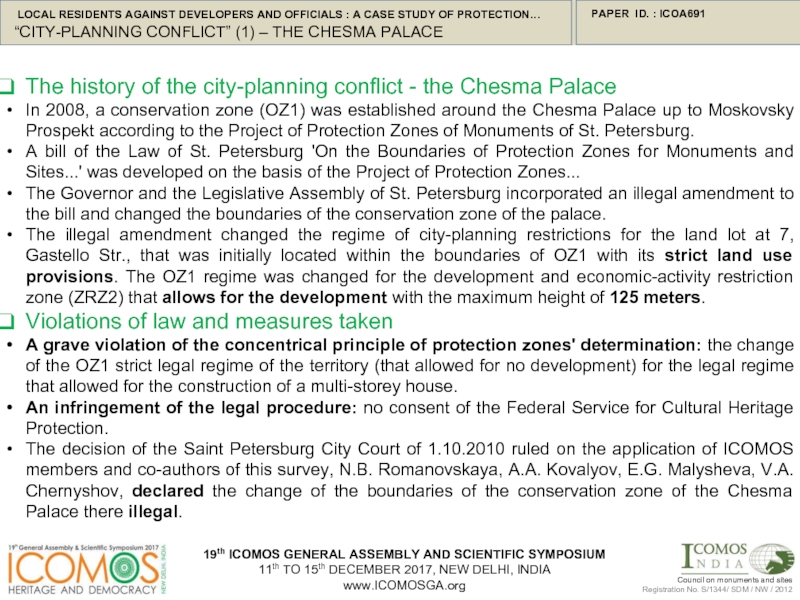
Слайд 11
PAPER ID. : ICOA691
On the right: the boundaries of the conservation
zone of the Chesma Palace in 2008 in the Law of St. Petersburg 'On the Boundaries of Protection Zones for Monuments and Sites...' before its distortion.
On the left: the boundaries of the conservation zone of the Chesma Palace distorted by the emerged ZRZ2 land lot in the Law of St. Petersburg 'On the Boundaries of Protection Zones for Monuments and Sites...'
Слайд 12
PAPER ID. : ICOA691
Activity of developers supported by the authorities:
When the
given law was amended in 2013-14, with the participation of ICOMOS member, architect Nikita I. Yaveyn and former ICOMOS member Mikhail I. Mil'chik, the ZRZ2 regime with a new maximal development height of 23 meters was preserved instead of OZ1, which was against the court decision.
In 2015, a project of a new house with de-facto height of 25.9 meters was developed for this land lot; a construction permit was issued. It did not comply with the requirements of monuments' protection and violated the city-planning legislation.
Dissatisfaction with the court decision of the owner of the business empire, oligarch Vagif Mamishev. He is also known for his failed attempt of the development of Farforovskoye Cemetery.
Illegal issue of construction permit (now challenged at court).
The change of owner and developer of land lot in 2016 (the land lot was bought by Settle-City Ltd).
The development of a new building project, even more top-heavy. In comparison to the Zenith cinema, the square went up 3.66 times, and the volume 4.88 times. The project does not comply with the restrictions that are in effect in protection zones.
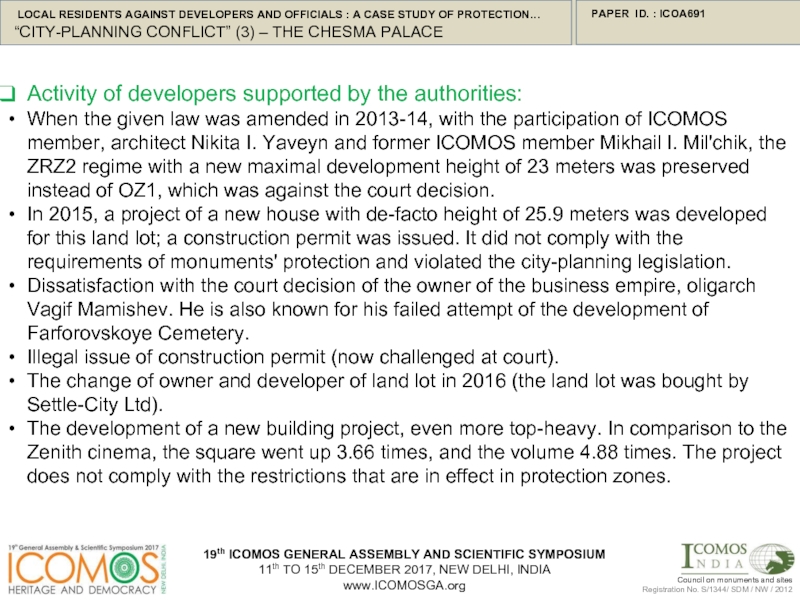
Слайд 13
PAPER ID. : ICOA691
View of the Chesma Palace, not blocked by
the residence house.
The 2015 project of the house blocking the view of the Chesma Palace from Moskovsky prospekt.
Слайд 14
PAPER ID. : ICOA691
The history of the city-planning conflict in Alexandrino
The
forgery perpetrated by the Committee on State Control, Use and Protection of Historical and Cultural Landmarks of St. Petersburg (KGIOP): the boundaries of the park were forged.
Validation of new illegal park borders by Boris M. Kirikov, vice-chair of KGIOP and ICOMOS member, in 2005. The new borders of the park did not correspond to those defined by the decision of Leningrad Region Executive Commission of 20.07.1972 #660 and by the decree of the Mayor of St. Petersburg of 30.01.1992 #108-R.
Illegal development of significant part of the park of the Alexandrino Country Estate from mid-2000s onwards at the border of Ulyanka 3A quarter.
Construction works as a part of redevelopment in the vicinity to the Alexandrino Country Estate (Ulyanka 2A quarter) are carried out by Voin-V Ltd. in accordance with the investment contract between the Government of St. Petersburg and Voin-V Ltd.
Provisions of the contract: resettlement of residents of standardised Krushchev-era houses by the developer
Activities of the developer: construction of new houses and selling flats, without any resettlement. By now, the following houses are built: one 18-storey house is built on the land lot 146 and two houses of 18 and 16 storeys on the land lot 147. These houses have spoilt the protected panorama of the Alexandrino Country Estate.
Activities of local residents: with the support of city-defenders, they challenge authorisations and approvals for the construction of houses on land lots 249.1 and 145 at courts. The authorities keep issuing new authorisations. On 26.11.2015, the Supreme Court of the RF declared the area development and demarcation plan for the whole territory of the quarter illegal.
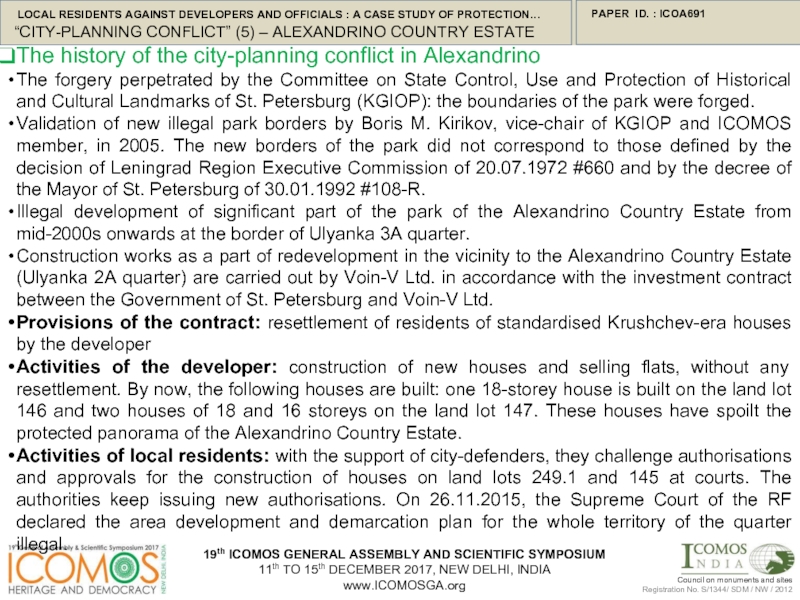
Слайд 15
PAPER ID. : ICOA691
The boundaries of Alexandrino Country Estate validated in
1972
The boundaries of Alexandrino Country Estate validated in 2005
Слайд 16
PAPER ID. : ICOA691
Building plots 145, 146 and 147 with protected
panorama of Alexandrino Country Estate in the foreground.
Слайд 17
PAPER ID. : ICOA691
Violations in the course of the construction -
Alexandrino
The transition of the constructing machinery across the territory of Alexandrino Country Estate, namely the parkway (land lot 145). In 2014, the defenders of the park managed to successfully challenge the permission for the transit of building machinery issued by the KGIOP at court.
Annihilation of a part of the pond on the land lot 145; the pond constituted a part of the hydrologic system of the Alexandrino Country Estate and was earlier connected to the ponds of the park. The part of the pond on the building plot was excluded from official documents: the pond existed de-facto until it was filled in by the developer. At the moment, the third construction permit is being challenged at court; two former ones were declared illegal by court.
The corruption of the protected panorama of the country estate and the natural vertical drop in the surface pattern (Littorina terrace alongside the Petergofskaya Road) as a result of construction on land lot 249.1.
An attempt to erect a 80-metres-tall building on the land lot, with the acting 30-metres' maximal height and additional mandatory restrictions on the protection of the Alexandrino Country Estate panorama.
Early stages of the construction of a 9-storey building; the construction permit is challenged at court (for the second time).
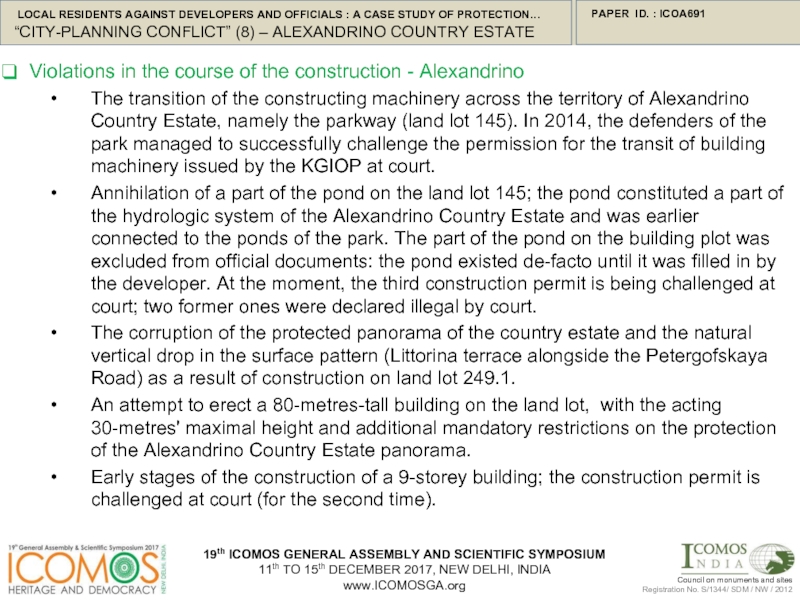
Слайд 18
PAPER ID. : ICOA691
Violations of legislation
International legislation. §172 of the Operational
Guidelines for the Implementation of the World Heritage Convention is not observed. Since 1990, §172 of the Operational Guidelines for the Implementation of the World Heritage Convention has not been observed by the authorities of St. Petersburg for a single time.
So far, the situation has developed to the point that in 2016 the President of the Russian Federation charged the Ministry of Culture and the Ministry of Foreign Affairs of the Russian Federation with a task to ensure that the Convention Concerning the Protection of the World Cultural and Natural Heritage and Operational Guidelines for the Implementation of the World Heritage Convention are observed in the Russian Federation. The authorities of St. Petersburg keep ignoring the Convention and the Operational Guidelines.
The legislation of the Russian Federation and St. Petersburg.
Federal Law of 25.06.2002 #73-FZ:
the developers have not worked out project documentation sections as to ensuring safety of the adjacent Chesma Palace and Alexandrino Country Estate and have not obtained an approval of these project documentation sections from monuments' protection agencies
protection zones established for the country estate are insufficient for its protection, and the section of a ZRZ zone is illegally established within the conservation zone of the Chesma Palace.
- the Law of St. Petersburg d/d 19.01.2009 #820-7 is being violated; this law protects the view of the Chesma Palace from Moskovsky prospekt, the panorama of the Alexandrino Country Estate and the Littorina terrace from Prospekt Stachek - which is not taken into consideration by the construction projects.
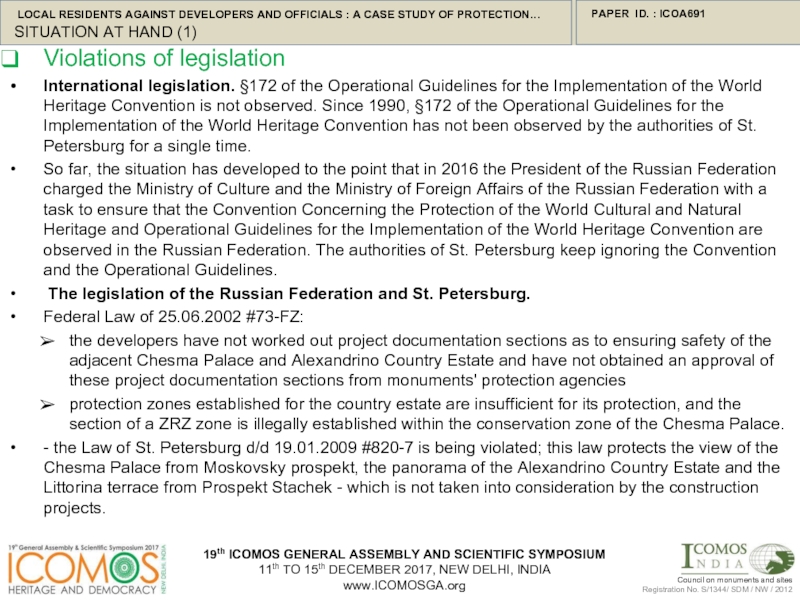
Слайд 19
PAPER ID. : ICOA691
The activities of city residents supported by the
independent ICOMOS experts
Upon an initiative of local residents, independent experts have carried out two assessments in accordance with the methodology of the Guidance on Heritage Impact Assessments for Cultural World Heritage Properties (ICOMOS, 2011): that of the Chesma Palace (RosNIPIUrbanistiki, expert T.V. Adorova) and that of the Alexandrino Country Estate (expert S.B. Gorbatenko, Vice-president of ICOMOS Russia).
Both assessments are conducted at a high professional level, with 3D modelling used, and they prove a highly negative impact on the Outstanding Universal Value of the considered objects. Both surveys have been filed to the Ministry of Culture of the Russian Federation for their submission to the UNESCO World Heritage Centre.
Слайд 20
PAPER ID. : ICOA691
The view of the Chesma Palace from Moskovsky
prospekt with the building of the demolished cinema and the projected residential building. 3D, NIPC Genplana SPb, 2017.
Слайд 21
PAPER ID. : ICOA691
Protected panorama of the Alexandrino Country Estate and
the natural vertical drop in the surface pattern from Prospekt Stachek with the projected building and without it. 3D, NIPC Genplana SPb, 2017.
Слайд 22
PAPER ID. : ICOA691
The considered cases demonstrate:
the examples of inappropriate cultural
heritage management. It causes threats to the safety of the components of the World Heritage Site 'Historical Centre of Saint Petersburg and Related Groups of Monuments' as a result of:
the Lakhta-Centre project completion;
attempts to construct residential and other developments by the Pulkovskaya Observatory (component #540-008), on the Kirchhoff mountain (component #540-031), on the Koltushskaya elevation (components #540-021 and 540-032), on 102, Moika embankment, in the historic centre (component 540-001), etc.;
the wish of developers to make the most of land lots they acquired;
the inability of the state authorities to protect heritage due to insufficient expertise or corruption.
Слайд 23
PAPER ID. : ICOA691
Two problems:
The first one is the disregard of
the law. In our opinion, the solution of the first problem (violation of laws) can be facilitated by the mighty development of the civil society, public control institutions, real replaceability of public officials. The existing actors of public control and electoral procedures demonstrate very poor participation of the population both in cultural heritage management and protection and in the statecraft. The corruption level would sufficiently decrease alongside with the development of civil society institutes, because the officials' responsibility before the people would grow up.
The second problem is the lack of cultural heritage promotion among the people, the lack of heritage awareness and the urgency of its protection among the local residents, developers and authorities. Active promotion of national and universal heritage is needed.
Слайд 24
PAPER ID. : ICOA691
Batorevich, N. (1998). The Chesma Palace. St. Petersburg,
1998. 155 p.
Gorbatenko, S. (2013). The Petergofskaya Road: A historical and architectural guide. St. Petersburg, 2013. P. 192-200.
Lavrentyev, N., Chernyshov, V., Malysheva, E., Romanovskaya, N. (2017). “The Problem of Protection of Architectural Ensembles of the Chesma Palace and the Alexandrino Country Estate in St. Petersburg as Parts of Components of the World Heritage Site”. Cultural heritage - a territory for dialogue, an International Scientific Symposium of ICOMOS, Russia: conference abstracts. P. 28-29.
Starkova, L., Lavrentyev, N., Popov, I. (2017). “On Determination of Boundaries of Components of the World Heritage Site as exemplified by the Alexandrino Country Estate in St. Petersburg”. Cultural heritage - a territory for dialogue, an International Scientific Symposium of ICOMOS, Russia: conference abstracts. P. 44-45.

